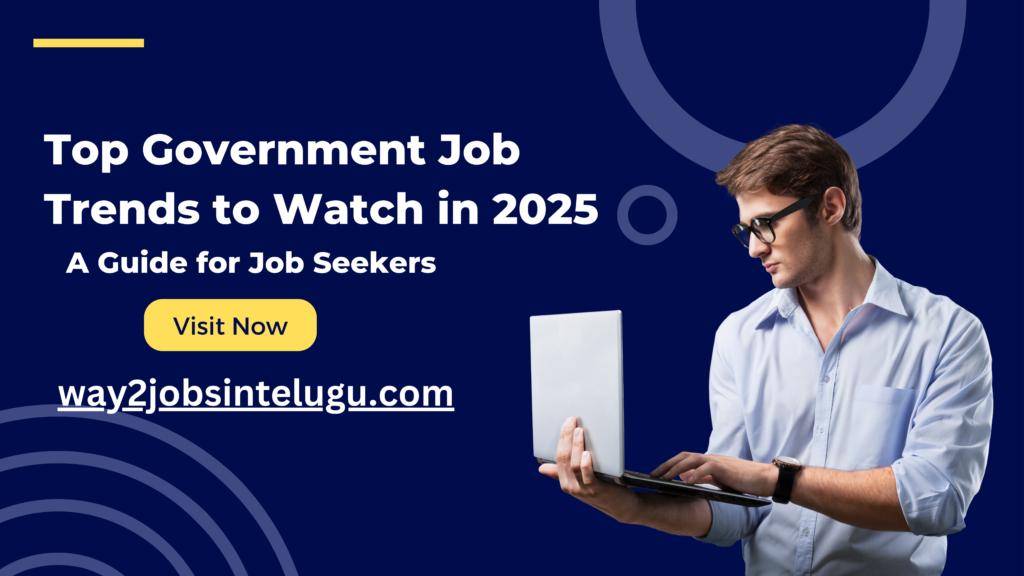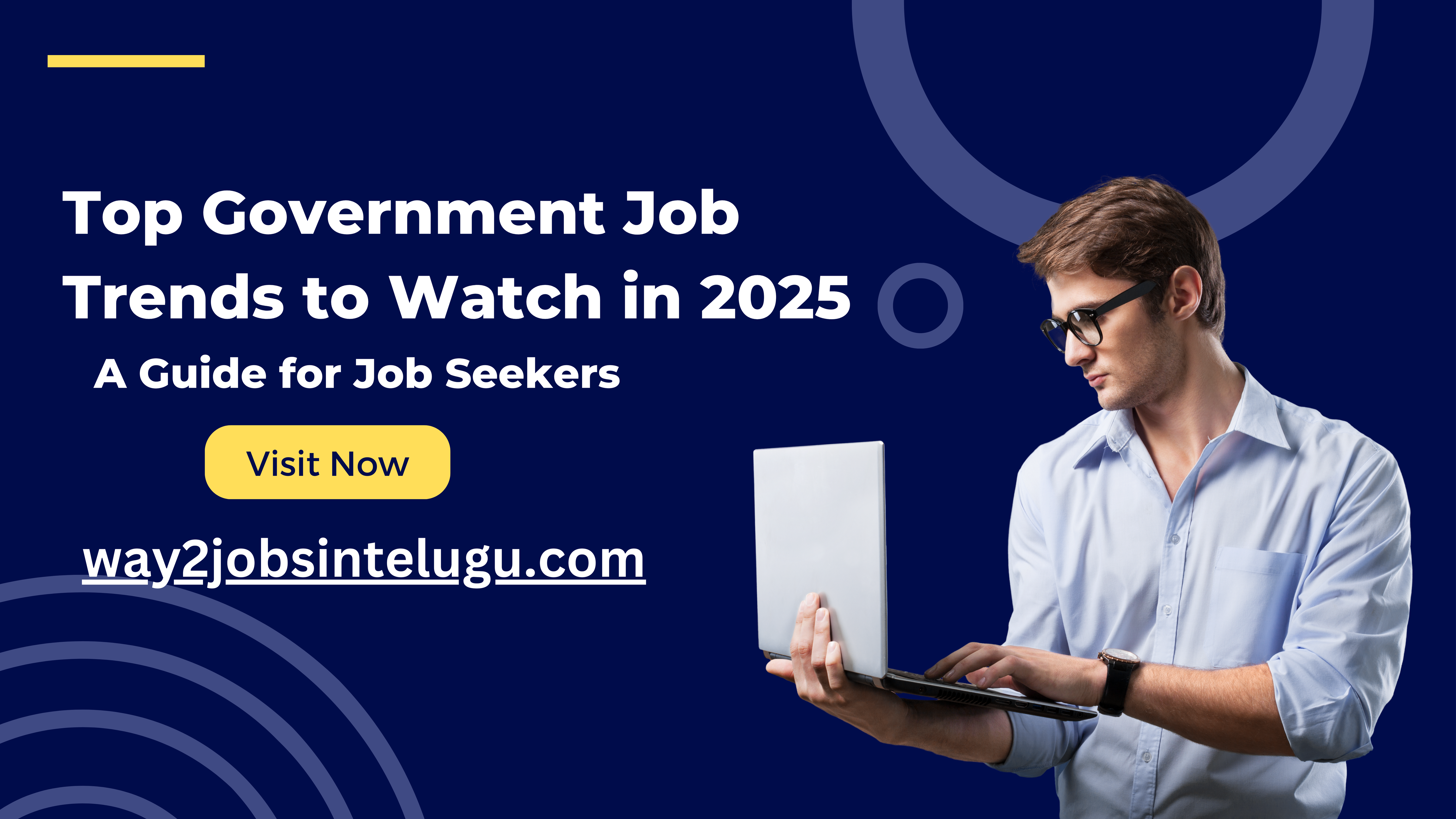
As we approach 2025, the government job landscape is undergoing significant changes. Technological advances, evolving workforce demographics, and the shifting priorities of public service are redefining recruitment, retention, and development practices in government roles. This article explores the top trends expected to influence government employment in 2025, providing insights for both aspiring job seekers and current public servants looking to navigate the evolving landscape.
- Increased Demand for Tech-Savvy Professionals
The ongoing digital transformation across government agencies is driving the demand for tech-skilled employees. As agencies integrate advanced technologies like artificial intelligence (AI), big data analytics, and cloud computing into their operations, the need for tech-savvy professionals will continue to grow. By 2025, we can expect several notable developments:
Enhanced IT Roles: Government roles focusing on cybersecurity, data analysis, IT infrastructure, and cloud management will see a significant increase. As more government services move online, agencies need skilled professionals to safeguard data, ensure infrastructure stability, and support secure, efficient operations.
Integration of AI: Government departments are adopting AI tools for various functions, from administrative processes to public service improvements. Professionals with AI expertise will be required to not only implement these tools but also oversee their ethical use, balancing efficiency gains with considerations around privacy and accountability.
Digital Literacy: By 2025, digital literacy will be essential for all government employees. Agencies are pushing for training that enables employees to navigate digital systems, use online platforms effectively, and understand the basics of data security, making modernization a smooth process.
- Emphasis on Remote and Hybrid Work Models
The remote work shift spurred by the COVID-19 pandemic has transformed the way governments view flexible work arrangements. The trend toward remote and hybrid models is likely to endure, reshaping the way government employees interact with their roles. Key aspects of this trend include:
Policy Development: Agencies will need to create comprehensive policies that support remote work while maintaining productivity and accountability. By 2025, these policies will focus on managing remote performance, maintaining cybersecurity standards, and ensuring team cohesion across virtual and in-person spaces.
Technology Infrastructure: With a greater reliance on remote work, government agencies will invest heavily in secure technology solutions. Systems that support virtual collaboration, data security, and secure information sharing will become essential, ensuring remote teams can operate as effectively as those on-site.
Work-Life Balance: Flexible work options are increasingly valued by younger employees, and government agencies will need to adapt to attract and retain talent. Emphasizing work-life balance, government roles will incorporate flexible schedules and remote options, aligning with the expectations of a modern workforce.
- Focus on Diversity, Equity, and Inclusion (DEI)
Government agencies are acknowledging the need for greater diversity, equity, and inclusion (DEI) within their workforces. By 2025, many agencies are expected to have adopted structured DEI initiatives, resulting in a more diverse and inclusive government workforce. These efforts will likely include:
Targeted Recruitment Strategies: By actively recruiting individuals from underrepresented communities, government agencies aim to create more balanced and representative teams. This may involve partnerships with educational institutions, outreach initiatives, and adjustments in hiring practices to attract a diverse range of candidates.
Training and Awareness Programs: Regular DEI training sessions will become standard, helping employees understand the importance of inclusivity and respectful workplace behavior. These programs are expected to foster a culture that celebrates diversity and encourages collaboration among diverse groups.
Measurement and Accountability: To ensure genuine progress in DEI initiatives, government agencies will implement accountability measures. Metrics to track DEI progress and regular reporting on diversity efforts will ensure transparency and allow for continuous improvement.
- Increased Use of Analytics in Recruitment
Data analytics is increasingly influencing hiring practices within government agencies, optimizing recruitment processes and enabling better workforce planning. By 2025, data-driven recruitment practices will become more prevalent, including:
Predictive Analytics: Using predictive analytics, agencies can anticipate future workforce needs, helping them identify potential skills gaps and make proactive hiring decisions. This will lead to more strategic recruitment aligned with long-term goals.
Streamlined Hiring Processes: Applicant tracking systems and AI tools are becoming integral to government hiring, streamlining processes and reducing hiring times. These technologies enhance impartiality, ensuring fairer hiring practices and improving the overall candidate experience.
Feedback Mechanisms: Data-driven feedback from recruitment analytics will help agencies refine hiring processes. Continuous feedback allows agencies to improve candidate experience, identify bottlenecks in hiring, and ensure their recruitment practices align with organizational objectives.
- Growing Importance of Employee Well-being
Employee health and well-being are becoming central to workplace culture, especially within government roles where stress and workload can be high. By 2025, government agencies will prioritize initiatives that promote mental and physical wellness, including:
Comprehensive Wellness Programs: Government agencies are expected to introduce programs focused on mental health support, stress management, and physical fitness. Access to counseling services, fitness subsidies, and wellness activities will help create a supportive environment for employees.
Workplace Flexibility: Recognizing the importance of work-life balance, agencies will focus on offering flexible work arrangements, such as telework options and flexible schedules. By supporting work-life balance, agencies hope to improve employee satisfaction and reduce burnout.
Employee Engagement: Regular employee surveys and feedback loops will help agencies assess and improve their well-being initiatives. These feedback mechanisms will allow agencies to adjust programs based on employee needs, fostering a healthier, more engaged workforce.
- Adaptation to a Multigenerational Workforce
As government agencies employ individuals from different generations—ranging from Baby Boomers to Gen Z—they’ll need to manage varied expectations and working styles. By 2025, the following approaches will likely help bridge generational gaps:
Tailored Training Programs: By creating training programs that cater to diverse learning styles and career expectations, agencies can engage employees of all ages. Personalized development options will help meet each generation’s unique professional growth needs.
Mentorship Opportunities: Government agencies will foster mentorship programs to facilitate knowledge transfer and bridge generational gaps. These programs will benefit both older employees who can share their experience and younger employees who can introduce fresh ideas and digital fluency.
Flexible Benefits Packages: Recognizing that employees at different life stages have varying needs, agencies will offer flexible benefits that accommodate diverse preferences. Options such as health benefits, retirement plans, and parental leave will be tailored to suit a wide range of employee demographics.
- Embracing Sustainability Initiatives
Sustainability is gaining importance in government operations, with agencies actively working toward environmentally friendly practices. By 2025, these initiatives are expected to shape both recruitment and job roles, including:
Green Job Creation: Roles dedicated to sustainability, such as climate action coordinators and renewable energy project managers, will become more common. As environmental policy becomes a priority, more government positions will focus on tackling climate change and promoting green initiatives.
Training for Sustainability: Government employees will be trained in sustainable practices, ensuring they understand how to integrate eco-friendly approaches into their roles. This shift reflects the broader goal of making government operations more environmentally conscious.
Collaboration with NGOs: Government agencies are expected to collaborate with non-profits and community organizations to enhance sustainability efforts. These partnerships will promote knowledge sharing and effective implementation of sustainability projects.
Conclusion
The landscape of government jobs is set to undergo significant transformation by 2025. Technological innovation, an emphasis on DEI, and a commitment to employee well-being will redefine government employment, making it more inclusive, flexible, and aligned with societal goals. These trends offer valuable insights for those seeking government positions or already serving in public roles. By understanding these shifts, individuals can proactively adapt to the changing environment, leveraging new opportunities to grow their careers and contribute meaningfully to public service.










